Buildings and Other Structures
Three Alarm Fire At Fire Extinguisher Factory
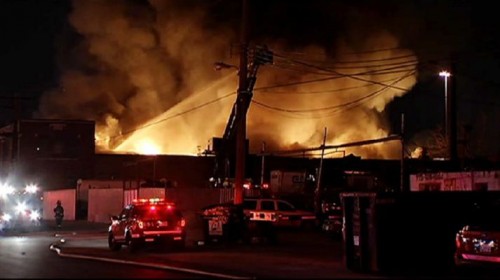
Its like rain on your wedding day. A fire at the fire extinguisher factory, isn't it ironic.
Posted By: Alex - Fri Mar 20, 2015 -
Comments (3)
Category: Buildings and Other Structures, Disasters, Industry, Factories and Manufacturing, Can’t Possibly Be True
Hotel Crane

This crane had become an eye sore that seemed unlikely to be renovated. Now it is a successful hotel of luxury suites.
Posted By: Alex - Fri Jan 09, 2015 -
Comments (3)
Category: Architecture, Buildings and Other Structures
Octagon Houses
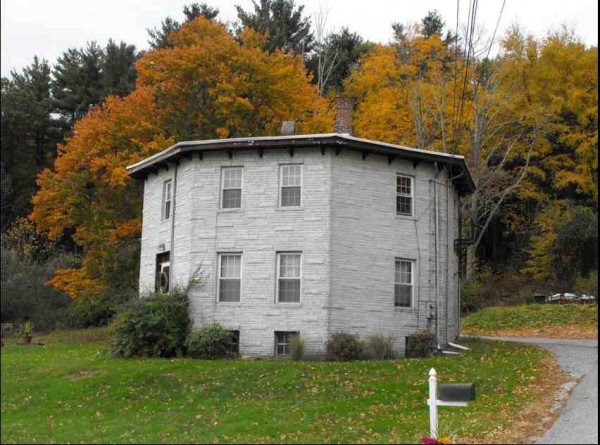
For a brief time in the USA, eight-sided houses were a thing. Based on the crackpot theories of one fellow.
The example above can be found in my native Rhode Island. I used to marvel at it all the time when I was younger.
Read the history here.
Order a book here.
Posted By: Paul - Mon Oct 20, 2014 -
Comments (10)
Category: Buildings and Other Structures, Eccentrics, Nineteenth Century
The Salt Cathedral of Zipaquirá
Catedral de Sal from H. Paul Moon on Vimeo.
Learn more here.
Posted By: Paul - Fri Oct 25, 2013 -
Comments (3)
Category: Buildings and Other Structures, Religion, South America, Natural Wonders
Chinese House in the Middle of a Road
Homeowner Luo Baogen, who lives in Wenling, China, refused to sell his house to allow the government to build a road through where it stood, so the government built the road anyway, leaving the house circled by tarmac. [atlantic.com]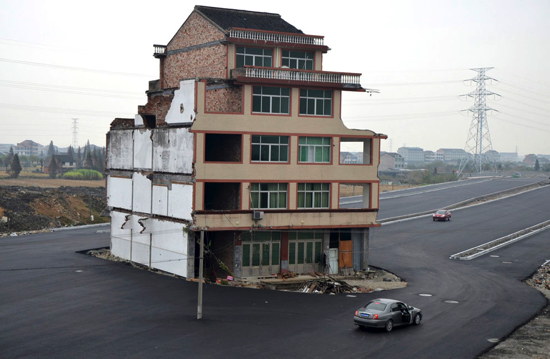
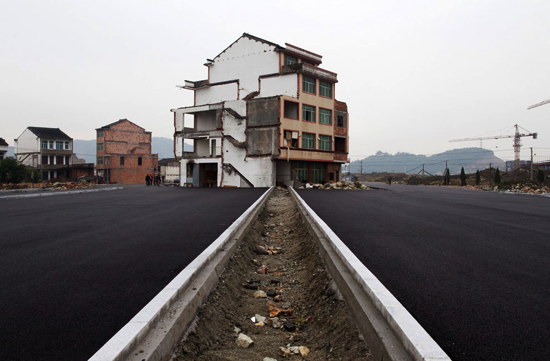
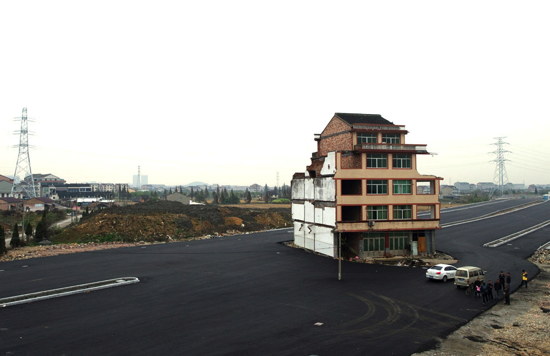
But recently Luo Baogen finally agreed to sell, so the house is now being torn down.
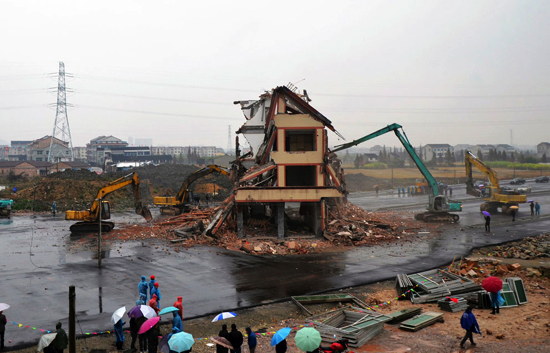
This definitely isn't the first time standoffs between homeowners and governments have resulted in houses stranded in the middle of roads. Here on WU, we previously reported about a Japanese example of the phenomenon from 1964. But it seems to me this happens more often in Asia than anywhere else. I have no idea why.
Posted By: Alex - Wed Dec 05, 2012 -
Comments (5)
Category: Buildings and Other Structures
Jack Fletcher’s House of the Future
In 1954, 23-year-old Jack Fletcher showed off his new home to the media. Reporters called it the "house of the future" because of all the unique features he had designed into it. The windows closed by themselves when sensors felt rain. Lights came on automatically when someone entered a room. The phone had a speed-dial feature. The lamps didn't need cords. Instead you just placed them over induction coils installed in the floor. And strangest of all, electromagnets caused pots and pans to float over the stove (which also used induction coils to heat the food).The house was in West Covina, CA (in the LA area). I wonder if it's still standing? I don't see why it wouldn't be, but I haven't been able to find an address for it. Read more about it here and here.




Posted By: Alex - Fri Jul 06, 2012 -
Comments (9)
Category: Architecture, Buildings and Other Structures, Futurism
The antique shop in the middle of a highway
People refusing to sell their homes to urban developers -- so they end up having highways and skyscrapers built around them -- is one of those things that happens often enough that it's 'no longer weird,' as Chuck would say. But here's an early example, from the mid-1960s.Tokyo hosted the Summer Olympics in 1964, and launched massive urban construction projects in anticipation of the games. Thousands of people were offered money to sell their homes to make way for new highways. Almost everyone took the offer of cash. But one elderly couple refused to move.

When the new highways were being projected, owners of houses on the chosen sites moved away more or less willingly, but this old couple decided that the indemnity offered was not enough for a home containing a lifetime of memories.
The old man boned up on his law and discovered that he could not be forcibly ejected, and that although he may be a nuisance, his house could not be considered a traffic hazard as it is plainly visible to the naked eye. There have, in fact, been no accidents up to now simply because traffic slows down to take a better look at the incongruous, isolated building.
So the local police agency turned to the Metropolitan Highways Corporation who, after one and a half years of vain negotiation with the stubborn couple, have now thrown the matter into the lap of the Tokyo Metropolitan Government.
In the meantime, the old couple have lost all but the most intrepid of their customers, for few dare to cross a busy highway at the risk of life and limb and, for the same reason, there are days on end when the old couple cannot get out of their house to do the necessary shopping. But old people, they say, need little sustenance.
The incessant blare of car horns and the overbearing odor of exhaust-gas fumes which would drive a younger couple to surrender, fall on age-deafened ears and insensitive nostrils, disturbing them neither during the day nor at night. For old people, they say, need little sleep.
The offer of money to remove themselves and resettle in a new home is no temptation to them, for their days of adventure are over and all their memories are enclosed within the four walls of this tiny building.
-- The East, vol 1, No. 5, 1965, p.54-55.
Posted By: Alex - Thu Jun 21, 2012 -
Comments (4)
Category: Buildings and Other Structures
Painless Withers Dental Laboratory
Great name for a dentist! You could have visited Dr. Withers if you lived in Salt Lake City, Utah during the 1930s.
From the Utah State History Digital Collection.
Posted By: Alex - Thu Jun 07, 2012 -
Comments (9)
Category: Buildings and Other Structures, 1930s
Kiev Bridge Climb
Do not try this at home.
Posted By: Paul - Sat Sep 17, 2011 -
Comments (3)
Category: Buildings and Other Structures, Daredevils, Stuntpeople and Thrillseekers, Stupidity, Russia
Hallucci
Hallucii from Gooshun Wang on Vimeo.
Posted By: Paul - Wed Aug 10, 2011 -
Comments (7)
Category: Buildings and Other Structures, Surrealism, Cartoons, Alcohol

| Who We Are |
|---|
| Alex Boese Alex is the creator and curator of the Museum of Hoaxes. He's also the author of various weird, non-fiction, science-themed books such as Elephants on Acid and Psychedelic Apes. Paul Di Filippo Paul has been paid to put weird ideas into fictional form for over thirty years, in his career as a noted science fiction writer. He has recently begun blogging on many curious topics with three fellow writers at The Inferior 4+1. Contact Us |




